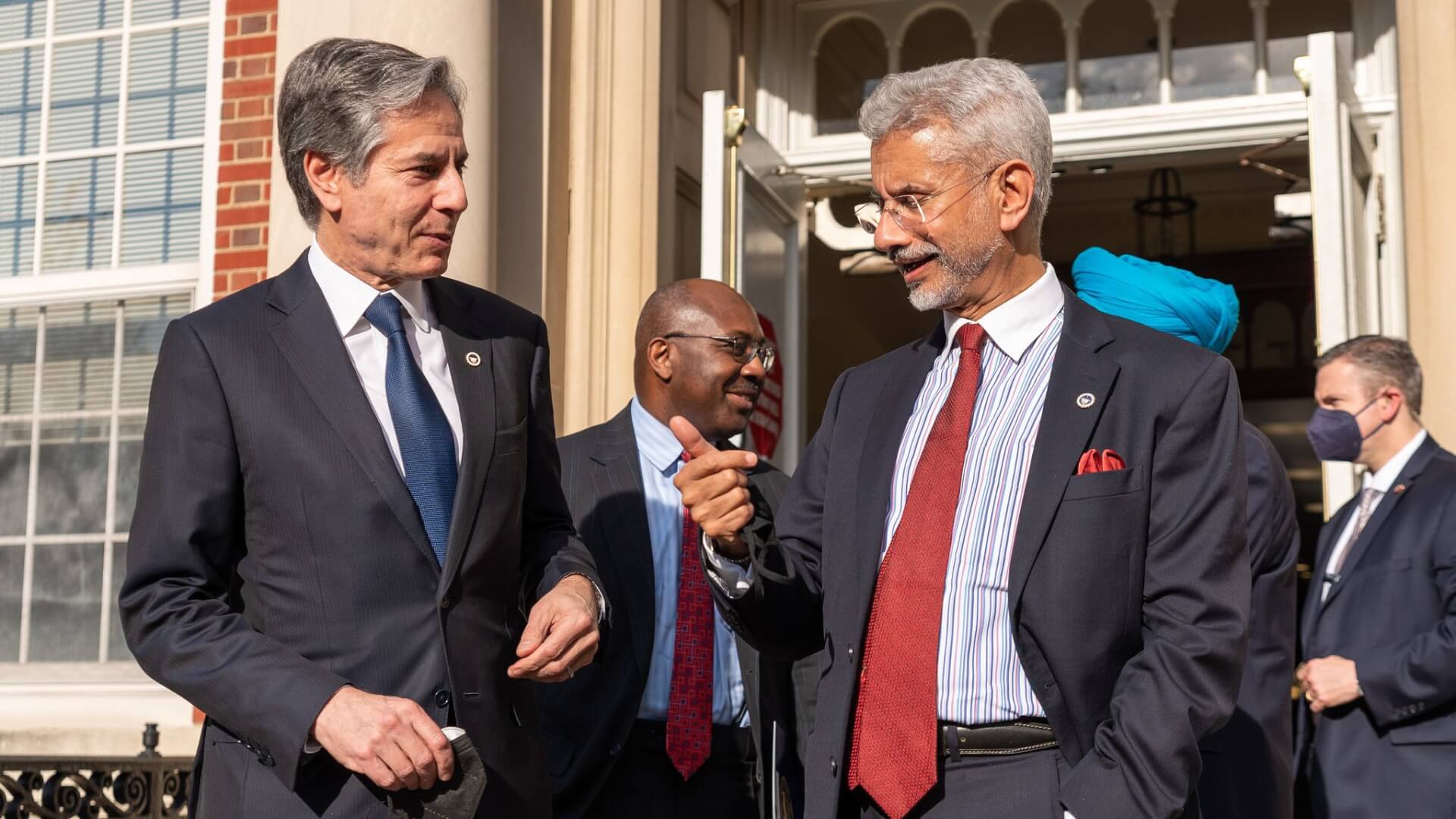As part of his visit to the United States (US) to attend the ‘2+2’ ministerial dialogue, Indian External Affairs Minister (EAM) S. Jaishankar visited Howard University in Washington DC on Tuesday and held discussion with Secretary of State Antony Blinken on India-US cooperation in the field of higher education.
The following is a brief summary of their discussion:
US Secretary of State Antony Blinken’s Address
Blinken began his speech by thanking Jaishankar for an “incredibly productive session” of the ‘2+2’ meeting of Indian and American defence and foreign ministers. The meeting focussed on improving mutual security and economic ties as well as efforts to bring the ongoing conflict in Ukraine to an end.
Noting that there are around 200,000 Indian students studying at American universities, Blinken stressed the importance of building upon cultural and educational ties to ensure that this number grows.
In this regard, Blinken said that a Working Group on Education and Skill Training has been established “to bring academic institutions in the US and India together to develop new joint research programs.” Blinken added that the group will “focus on creating more opportunities for universities to partner on exchange programmes.”
Blinken said that students from the US and India have greatly benefited from studying in each other’s countries and the insights they gain are used for advancements in their own countries. For instance, Blinken notes that such knowledge has been used to transform India-US trade relations.
Glad to join @ECA_AS Satterfield and my friend @DrSJaishankar at @HowardU today to discuss our joint effort on education and skill development with Indian and American students and educators. These deep people-to-people ties are central to the strong link between our nations. pic.twitter.com/IvZpCQuZo1
— Secretary Antony Blinken (@SecBlinken) April 13, 2022
He therefore stressed on the importance of people-to-people ties in strengthening bilateral relations. “We do a lot of work as diplomats between our countries, but ultimately what really matters are those bonds between our people,” Blinken said, adding that “this is what really brings us together.”
He said that contribution of youth is necessary for finding solutions to the world’s biggest challenges, whether it be climate change, COVID-19, or creating a more inclusive global economy. “To put it another way, the US-India Strategic Partnership, I am convinced, is absolutely crucial, essential, for addressing the problems of the 21st century.”
Indian External Affairs Minister Subrahmanyam Jaishankar’s Address
Jaishankar said that strengthening India-US educational ties is crucial to connect our countries, societies, and peoples. “When it comes to people, the most natural place to focus is on young minds with a curiosity about the world,” Jaishankar said.
The Minister said that US-India cultural and educational ties have begun to take shape recently and its impact is being felt in not only strategic and security ties but also economic and technology partnerships. “A key driver of this change has been its human element. The 4.4 million Indian diaspora has literally defined our image in this society and helped forge relationships that are an enormous source of strength for us in our work,” he added.
Pleased to participate in this conversation with my friend @SecBlinken.
— Dr. S. Jaishankar (@DrSJaishankar) April 13, 2022
The Working Group on Education and Skill Development will further enhance opportunities for #IndiaUS cooperation. https://t.co/hVCXIurOMw
“For our ties to grow it is equally necessary that there is a better understanding of India and the world on the part of young Americans,” Jaishankar said, stressing that the US and India can only be natural partners “when our people have a strong sense of connect.” Hailing the establishment of the working group, Jaishankar not that it “will enable us to explore a range of opportunities that exist in the field of education, research, innovation, and entrepreneurship.”
Interaction With the Audience
Responding to a question on India-US partnership in the healthcare sector amid the ongoing COVID-19 crisis, Jaishankar said that ties in the healthcare sector matured following the outbreak of the pandemic. He noted that India is producing three vaccines—the Novovax, the Corbevax, and the Janssen—as a “direct outcome of our relationship with the US.”
He also praised the US for providing the greatest help to India when the Delta variant of the Coronavirus swept across the country overwhelming hospitals and creating shortages in certain medicines and oxygen respirators.
Regarding encouraging more American students to pursue studies in India, Blinken said that undertaking more initiatives to develop people-to-people ties is the way forward. He said that State Department already has a host of programmes that enable greater cultural contact and added that the Department plans to undertake more initiatives like this in the near future.
Blinken noted that while these programmes will focus on a variety of subjects, particular importance will be given to climate, COVID-19, and emerging technologies.
When asked about how India intends to attract more US students, Jaishankar said that there is a “much stronger appreciation of the need to have international students” following the announcement of the National Education Policy (NEP) in 2020. The NEP allows foreign universities to set up campuses in India.
He noted that apart from the NEP, India should take more initiatives to attract US students and not leave it to the students alone. “There have got to be programmes. There have got to be mechanisms, efforts which would create a strong pull factor,” Jaishankar emphasised.
Jaishankar concluded the discussion by stating that attracting more foreign students is “one area where India has not done as well as we would have liked to.” “I think it’s time to address that more effectively, and I’m very sure that we will do so,” he said.

